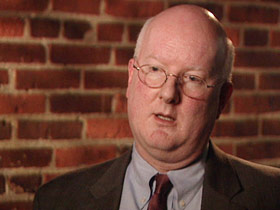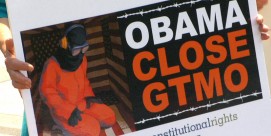In This Episode << SLIDE LEFT TO SEE ADDITIONAL SEGMENTS
Shaun Casey Extended Interview
Read more of Kim Lawton’s interview about just war and Iraq with Shaun Casey, assistant professor of Christian ethics at Wesley Theological Seminary in Washington, DC:
Q: Three years ago, you said the U.S. would not be morally justified to invade Iraq. What do you think today?

A: I think that initial assessment has been proven to be true, to be right. I think the facts on the ground have confirmed those of us who felt the war would not be just. Unfortunately, as you look at the ongoing quagmire, carnage, however you want to describe it, it is very difficult to maintain that this war was initially just, and certainly its continued prosecution doesn’t fulfill the criteria of the just war ethic. So I think basically that judgment was confirmed.
I think, too, the overwhelming majority of ethicists who took that position feel confirmed in that judgment. Now obviously that raises a lot of contemporary questions about where do we go next, and those kinds of things, but it also raises a number of questions about how the just war ethic was used and applied. If you’re in this business, you look at wars both retrospectively and prospectively. In other words, you try and learn from the last episode lessons that might be applicable in the current ethos, and now ethicists are beginning to consolidate our conclusions about the Iraq war, about its justice or its injustice.
Going in, the overwhelming majority of ethicists who study the ethics of war were opposed to this war on just war principles. Obviously, the pacifists were against it by definition. For those of us who look at the just war ethic, the overwhelming majority looked at the war, looked at the prospects, looked at the ethic and said this is not going to be a just war. However, there were a number of folks, a small number but a significant number nonetheless, who used the just war ethic to try and justify this war.
One group looked at only a selective set of the criteria and cherry-picked a couple of them and tried to make a positive case for war. But they didn’t look at all the criteria. One group looked at it really from a partisan perspective, I would argue, and in this category I would put a number of conservative Catholic laypeople who were very much caught up in promoting the relationship between the Catholic Church and this administration, and it seemed like they were trying to provide an argument or set of arguments to the administration. Interestingly enough, the administration never picked up on those specific arguments, and the fact that two popes and 170 American Catholic bishops said this war, in fact, is not just really didn’t stop this group of partisans trying to use the just war ethic to make a justification of going in.
There was a group that some scholars would call the enablers — very sophisticated theorists and ethicists who know a lot about the history and the theory of the ethic but, frankly, are not very good at looking at specific cases. In the medical profession there is often a distinction between research doctors and practitioners, in other words, clinicians. And the same is true in the division of labor within the just war ethic. There are scholars of its history and its theory, and then there are also practitioners who apply it to specific cases. I think some of the folks who tried to justify the war, frankly, weren’t very good at making that transition from the theory to actually analyzing the facts on the ground as we knew them going into Iraq.
Q: Do you think that in order for a war to be just it needs to meet all the just war criteria?
A: I would argue that’s the case. You have to meet all of them. Some ethicists say, well, no, you need to meet a certain threshold, although that’s very fuzzy in their minds. I do think a preponderance of the criteria had to be met. You can’t simply take one or two and say okay, I’ve made a comprehensive case here. You need to go through all of them and apply all of them, and then say what does this information look like, what does this data present to me, before you make the final judgment. I personally believe you have to make a credible case on all of them before you can say yes, any particular war is justified.
It was very hard to do in Iraq, I think. If you went through systematically, there were three or so of the criteria that were very difficult to make a comprehensive and persuasive case for, and [in] the view of most ethicists who oppose the war, the case had simply not been made by [that] handful of folk who were trying to make the pro-war case.
Q: Some people say the cause of going to the aid of people who were suffering under oppression was strong enough that it merited going in. They cite, for example, Rwanda and the lack of intervention there, and people now say, “Why didn’t anybody do something to stop that?” How do you respond to that?
A: First of all, it’s very important to look to actual justifications that were used to go into war, and the humanitarian argument was not the centerpiece of the Bush administration’s argument. That’s very important to see. The centerpiece arguments were [Saddam] had a nuclear program, he had weapons of mass destruction, and he had links where he aided and abetted Al Qaeda. We now know both of those, in fact, were not true. I think the members of the Senate and the Congress who voted to authorize the war didn’t think they were voting for a humanitarian intervention. That was an add-on argument that was brought on, actually, later. That wasn’t the central case. It’s important to keep your eye on the ball of what really was argued by the administration.
Secondly, sure, you can make a case for humanitarian intervention in theory. We should have intervened in Rwanda, just as somebody should intervene in Sudan at this very point. The question about Iraq was, did it in fact actually meet any threshold? Was the humanitarian crisis large enough to merit outside intervention? And that case was never fully argued on either side, so we never had that discussion. There are a lot of other places in the world, including Sudan, where there’s a real genocide going on right now, and we don’t see this administration making an argument for humanitarian intervention. That argument falls when you look at the real justification that was given by the administration, and the fact that there truly are genocides going on right now in parts of the world, and this administration seems to have no compulsion about military intervention in addressing it. I think that’s a specious argument, the humanitarian question. I don’t think it meets the thresholds. I think there are other cases that are perhaps more pressing.
Q: Let’s talk about imminent threat and the administration’s pushing the notion of a preemptive war. Does preemptive war fit with just war tradition?
A: This is a common mistake — that the [just war] ethic talks about the possibility of preemptive war. The Bush national security doctrine was not a doctrine of preemption; it was a doctrine of prevention. And the ethic is very clear that preventive war is ruled out. What’s the distinction between preemption and prevention? Preemptive war is simply when there is an imminent, grave, and visible threat. If somebody is on the verge of attacking you, you can viscerally respond with a first attack. Therefore you have to have a grave threat, it has to be imminent, and you have to have no other options available to you. It’s a defensive move.
Preventive war is when you look down the long-time horizon and you say, “I have an enemy lurking out there, and I’m fearful if I wait much longer they are going to be stronger and more of a threat down the road, so I’m going to go attack them now and preventively keep them from ever attacking me in the future.” The ethic is very clear. That kind of long-term preventive argument is not permissible morally, and that’s precisely the kind of argument that you find in the initial Bush security strategy, which they’ve recently reaffirmed.
The difficulty with preventive war is that you deal to yourself a right to look at the long horizon, the long time line, and attack somebody, but you would never accept that argument being aimed at you. [There is] a lack of applicability, a lack of reciprocity there. Certainly the ethic says you have the right to attack preemptively, if in fact you see this imminent, visible threat, and you have no other options. [Those were] not the circumstances we faced with Iraq. We now know they had no weapons of mass destruction, they had no ability to deliver any had they possessed them, and we had United Nations weapons inspectors on the ground at that time. Had we allowed them to do their work, we would have learned this in a fashion that would not have required 2,300 United States deaths, 17,000 casualties, and tens of thousands of dead Iraqis, if we had allowed that process to play out.
Q: How great a concern do you have about how people handle the last resort criterion of the just war principles?
A: That was one of the most disturbing pieces of the whole just war discussion — that almost without exception, the folks who tried to make the case for war in terms of the just war ethic either ignored last resort or explicitly said, “Well, we don’t need to observe that because times have changed,” and it’s just plain inconvenient when, in fact, last resort says if you have any peaceable avenues to pursue that might be fruitful, you have to try those avenues and exhaust them first. Those of us who argued against the war said we had United Nations weapons inspectors on the ground doing their work, and had they been allowed to do their work in an unfettered way, we would have learned that Saddam didn’t possesses these weapons.
As George Will put it, the war in Iraq was an optional war, and the just war ethic says optional wars are not acceptable. Last resort says only necessary wars can be fought, and clearly that was not the case in our invasion of Iraq.
Q: Going back to prevention and preemption, isn’t it tricky to determine when a threat becomes imminent?
A: As Michael Walzer says, you have to have concrete evidence, and that’s what we lacked at the time, and now we have people saying, “Oh, well, we’re surprised that they didn’t have any weapons,” or “Oh, there wasn’t any link to Al Qaeda.” There was no direct evidence that either of those things was, in fact, true. The ethic demands concrete evidence, not just a hypothesis on the part of a nation that wants to invade another one. Sure, that can be very nerve-wracking if you have an enemy you don’t particularly trust, or you have an enemy like Saddam Hussein, who doesn’t have a particularly good record in terms of invasions and handling of weapons.
But imagine a world where the enmity between two nations was, in fact, just cause, the hypothesis that they might be dangerous to me. If that becomes a warrant for preemptive or preventive war, then the entire globe becomes a bloody sea of chaos, and it’s no way to build an international system.
Q: The just war ethic also talks about right conduct during war. How has the U.S. done?
A: I think there are a number of concerns with the U.S. in bellum criteria. They simply say you can’t directly target civilians, and when you employ specific use of force, it has to be proportionate to what you’re trying to accomplish. I think there are questions under both. Certainly in the invasion of Afghanistan, there were a number of reports in The WASHINGTON POST that called into question whether or not we were honoring this discrimination, whether in fact we were targeting civilians or not. The question’s been raised about our military practice. We simply don’t know. We don’t have the evidence to confirm or deny that. Certainly our military, the air force in particular — it’s committed to very high standards of not targeting civilians. The POST reports raised questions about CIA and Special Forces targeters on the ground in Afghanistan. I’ve seen no resolution of that discussion. I’ve seen no discussion of our actual tactics on the ground in Iraq, so that’s open.
But, on the other hand, you look at our normalization of [the] use of torture in Iraq. You look at our rendering of Iraqis and other people to third-party countries where terror is, in fact, apparently being used on these people. You look at the use of illegal wiretapping in this country. It certainly raises the question whether or not we have used proportionate means, and it raises questions about whether we have directly targeted civilians or not. It’s an open question. I don’t think anyone can give a definitive answer about the conduct of war.
Q: Even if we weren’t justified going in, the reality is we are there. What ethical principles should be considered in deciding what to do next?
A: You have some people who say stay the course — the Pottery Barn analogy, “you break it, you own it,” and that’s an awful analogy. We don’t own any country. What that says is essentially we can’t admit a mistake, and we can’t pull out; we’ve got to stay there until we fix it. Another option would be to escalate. Senator John McCain says we need several hundred thousand more troops on the ground to really fix it, to fulfill our moral requirements.
I say we really need to withdraw. The truth is there are really going to be no happy, perfect outcomes, given what we have done in Iraq and what’s happened in the first three years of this war. There is going to be no scenario where everybody’s going to be happy and peace instantly breaks out.
Having said that, withdrawal can mean a number of different things. It can mean partitioning the country between the three major factions and bringing in international entities, multilateral entities to supervise that transition, or it can mean unilateral withdrawal. I personally come down in the middle. I think we need to announce a specific timetable and begin the drawdown and pull back and essentially tell the folks in Iraq and the international community it’s time for them to step up and take over. Certainly there are no guarantees that’s going to lead to anything other than chaos, but the truth is I’ve come to the conclusion that it’s our continued military presence there that, in fact, is feeding the insurgency and is preventing Iraq from taking the next step as a nation, whatever that step happens to be. We’re no longer in a position to dictate terms, unless we’re going to send in a million troops to completely pacify that country. We don’t have the capacity, we probably don’t have the moral right to go in now and dictate terms to the various folks on the ground in Iraq as to what the moral outcome should be. My read of the ethic is we made a mistake, we need to admit that mistake, and now we need to minimize the damage and find a way to extricate ourselves that does the least amount of possible harm. Certainly people of good will can disagree, [but] that’s the discussion we need to be having now.
Q: Does just war theory say much about what happens after war, when the conflict is over but peace hasn’t really begun?
A: The war is still going on. That’s very important to see. The war is still going on, and we still have 133,000 troops on the ground, so the notion that we went in, we liberated it, and it is over is not really true at all. The war is still going on.
I think the American people have come to the right realization morally — that this war is immoral. Then the question becomes, well, what do we do from a moral perspective? The ethic does talk about right intention, and I would argue that right intention applies throughout the length of a conflict, not just the initial decision to go in or not to go in. If we reach a point where we realize that our intentions are misguided and they are wrong, I think the ethic compels us — particularly if we can show that we’re not prosecuting this war in a moral fashion. That’s double evidence to say morally we need to exit.
Q: Has this experience brought up areas of just war teaching that you think need to be thought through more?
A: I think there are several ways the discussion needs to advance. I would argue this war was never justified by the administration in the categories of the just war ethic. They said our cause was just, and they argued under a global war on terrorism that there were weapons of mass destruction, that there were links to terrorism, which we now know are not true. The president never made a full-blown case in the categories of the just war ethic to justify this invasion. Had the just war ethic actually been the lens through which our national leaders made the decision, we would have had a much different public discussion and maybe even a different initial step into Iraq. I would say it shows the relevance of the ethic. If only our leaders had actually exercised it, then maybe we would have had a different outcome.
But also, non-state based terrorism raises a number of issues for the just war ethic, because sometimes in its classic formulation people use the just war ethic in a nation state-based system, where it’s Country A against Country B. Here we have insurgents who are coming from multiple countries. We have an Al Qaeda movement not based in any particular nation. We need to spend some time thinking about what it means to prosecute and to chase down the perpetrators of 9/11, for instance. It’s a very complex moral issue. That’s going to be an area where just war ethicists are going to have to do a lot of hard thinking in future days.
Also, the issue of humanitarian intervention. It’s getting a lot of attention from theorists. My fear is that the debacle in Iraq is actually going to undermine public will for going into a place like Sudan, which may ultimately demand it. The irony is the neglect of the just war ethic in this case may actually lead to a much lower tolerance on the part of the American government and the American people to look at cases like Rwanda, to look at Sudan and say, you know, maybe we do have a stake in intervening in those cases. There may be an analogy to the Vietnam syndrome, post-Gulf War, that says Americans are going to be less engaged in the world because of the debacle on the ground and the quagmire in Iraq, and that would be tragic.
Q: Some just war thinkers are talking about the need to flesh out the concept of a “just occupation” under ethical principles. Is this something just war theorists should be thinking about?
A: Oh, absolutely, and I think the ethic does give us some guidance about what an army’s presence ought to be if, in fact, they are occupying a particular country. But the problem with saying we’re an occupying entity downplays the fact that the war is actually still going on. It is not over. The analogy is not to postwar Germany or to postwar Japan. I think the analogy is to an ongoing war in a place like Vietnam. But certainly I think the ethic says you have to minimize your footprint there, and you want to get out as soon as you can, whenever you intervene. The notion that you’re going to stay there for decades and decades or for [there to be] permanent bases in Iraq, as it looks like we’re in the process of doing — I think the ethic calls that into question. I agree with the assessment that, indeed, when you talk about occupation, ethicists need to think longer and harder about what does that actually mean from a moral perspective. But I don’t think that’s where we are currently.
In addition to the doctrine of preventive war that the administration held up, there are a couple other things worth noting. One is the notion that we’re fighting this war to rid the world of evil. The first time I heard that I thought, well, that’s just a rhetorical flourish and that’s going to go away, because it really sounds over the top. And yet you find this phrase in a number of the president’s speeches, where the global war on terror is to rid the world of evil.
As a Christian theologian, I have to stand up and say that is one of the dirtiest, most heinous forms of classic heresy to be found in the Christian tradition. No invading army rids anyone of evil. That’s just not within the human capacity of any government or any group of soldiers or people who are fighting. I find it very troubling, the theological tint to some of the justification that has been offered by this administration. and that certainly doesn’t fit the categories of a just war ethic.
In tandem with that is the notion that underneath all the various particular forms of expression of the Islamic faith — the Shias, the Sunnis, the Kurds — was this longing for a kind of Jeffersonian American democracy. That we would be welcomed with rose petals by these people because we liberated them, and they were going to be able to set up a kind of democracy analogous to America has really been proven wrong in this case, and [has] proven to be another dangerous doctrine — [that] somehow democracy can be exported by invasion, and underneath deeply held religious beliefs is this lurking human core of longing for Western forms of democracy. Ironically, in the long run that’s going to undermine our efforts at promoting democracy in the rest of the world. There was a philosophical assumption that underneath all this specific religion was, in fact, this American or Western commitment to democracy, which unfortunately, I think, has been demonstrated to be false.







